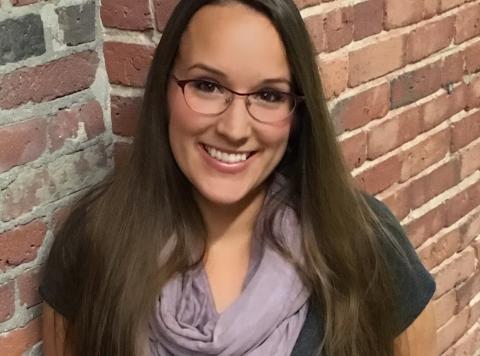
Kara Kelly-Martin ’19 began her UNH career in Durham, focusing on communication sciences and disorders with a focus on Deaf and hard-of-hearing studies. She then moved to Boston to work with Deaf and Deafblind community members in accessibility-related and educational settings. This experience, she said, this experience inspired her to further her education in American Sign Language (ASL) interpretation.
“Among incredible insight to their deeply rich culture, I also recognized the shortage of providers in communication access between them and the non-Deaf world,” Kelly-Martin said. “With my previous beginner education in and exposure to ASL, I felt drawn to the possibility of helping to bridge these linguistic and cultural gaps.”
Kelly-Martin began pursuing her ASL/English Interpreting degree at UNH Manchester in 2015, citing affordability, doable commute, family support and an inviting Deaf community as a few reasons why she chose UNH Manchester. Her choice was also reinforced when she and her husband decided to move back to New Hampshire following the birth of their son in 2017.
Now in her final year of the program, Kelly-Martin is working alongside a nationally certified ASL/English interpreter as part of the immersive senior capstone field experience. We caught up with Kelly-Martin to learn more about her experience.
What is the ASL/English Interpreting capstone experience like?
One word—intensive. The program requires a total of 320 field experience hours to be completed by the end of two semesters. I was paired with a Nationally Certified ASL/English interpreter, and then the experience became that of a mentor-mentee based internship. Multiple times a week, I meet with my mentor to attend professionally interpreted situations. These jobs vary in settings: doctor’s appointments, business meetings, conventions, college classes, employee training, etc. The hours are broken up into categories that reflect the aspects that make for a well-rounded ASL/English interpreter, including prep and process time, observation, direct (what we refer to as “hands up”) time, social time (essentially networking and building rapport with Deaf community members), and Deaf mentorship time. This “in-the-field experience” is on top of bi-weekly class meetings, reaction papers, presentations, frozen-text translation work, and journaling. Many of us are non-traditional students working jobs, supporting our families, etc. and so needless to say the year makes for a very busy, focused, but worthwhile opportunity.
How is your capstone experience preparing you for your future?
Being afforded an up-close perspective into the world of interpreting alongside such skilled, compassionate, knowledgeable and professional mentors has been extremely valuable. Not only have they given me insight into the intricate practice of such a profession, but they have modeled to me what becoming an interpreter really means in terms of allyship to Deaf people. My understanding of the field has changed in significant ways this year, helping me to gain a more mature ability to self-analyze and reflect on the qualities that both the Deaf and interpreting communities value. Additionally, this experience has given me ample, low-risk opportunity to polish my ASL skills, for which I am grateful!
How did the ASL/English Interpreting program prepare you for your capstone experience?
From the beginning, the program’s faculty, both Deaf and hearing, have encouraged as much immersion into New Hampshire’s Deaf community as possible. Building these relationships and being welcomed into their culture, has been the most important factor in preparation for my field experience. It is a humbling moment, to realize the amount of trust Deaf people put into interpreters every day. This experience takes it one step further in asking them to allow yet another pair of eyes on them. The program does an exceptional job of instilling in us that a good and pure attitude is the root of a great interpreter. Preparing became less about my linguistic weaknesses, and more about working towards attaining Deaf Heart.
Any advice for incoming ASL/English Interpreting students?
I would encourage them to not overlook the resources and opportunity we have right here at UNH Manchester! Pick those brilliant minds that are educating you! If there is ever a time where you feel like you are not understanding, exceeding or getting enough, challenge yourself to amend that feeling. Go to Deaf events. Use the ASL tutors. Go to instructors’ office hours. Research for fun to get in the habit of increasing your knowledge of the field early on. Read about Deaf culture and history, and then go to MORE Deaf events. Ask questions with respect and perspective. And have fun—appreciate and enjoy the privilege of learning.
What are your hopes for after graduation?
I am going to take some time off from formal education and continue to focus on my family and current projects I have been investing in. I recently stepped out of special education to give more time to my work in theatre accessibility, and to chase my very energetic two-year-old son around! The most exciting and imperative next step on the interpreting front, however, is to take the state screening and become licensed in N.H. I hope to do this in the very near future.